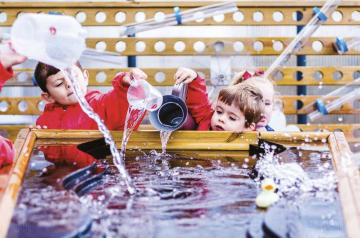CHILDREN from some of the poorest homes in the UK are being given the chance to learn, experience and develop skills that would otherwise be completely out of reach. They are enjoying days out, visiting the theatre, learning ballet, basketball and tennis, and being taught to play the piano and the violin. And the results are startling. Headteachers at the 100 schools, involved in INEOS’ groundbreaking Forgotten 40 project, say they have seen improvements in their pupils’ self-esteem, resilience, confidence and willingness to learn.
“A trip to a bowling alley might be a typical outing for a child from a more affluent home, but to our children, it is like giving them the world,” said Andrew Williams, headteacher at Penrhys Primary school in the Rhondda Valley in Wales.
The Forgotten 40 project is now in its fourth year and will run for seven years. It was founded by INEOS whose chairman Sir Jim Ratcliffe grew up in a council home in Failsworth, Manchester.
He enlisted help from a trusted team of experts in 2020 after reading disturbing reports about growing childhood poverty in the UK. Over the past three years the 100 schools, chosen by INEOS, have each been given more than £60,000 – and headteachers are trusted to spend it wisely on schoolinspired initiatives to improve the lives of their pupils.
So far they have invested in one-to-one counselling for troubled pupils, breakfast for all, boxing lessons to relieve the stress of SATs, and opened shops selling discounted food and household items. They have even bought beds and bedding for children who had none.
“If a child is tired because they haven’t slept well or they haven’t eaten, they are not going to be in a good position to learn when they get to school,” said Andrew.
Teachers also recognised the importance of taking parents on the journey too – and opened up after-school cookery classes to help them understand the importance of a healthy balanced diet.
One of the schools currently being supported by Forgotten 40 is Angela Rayner’s former primary, Bridge Hill in Stockport. The Deputy Prime Minister said she often went to school, not having eaten breakfast.
Although INEOS is funding the initiative, it is run by a team who really understand the challenges facing today’s primary school headteachers. Elaine and John Wyllie, Brian Padgett, Sheila Loughlin and Elaine Crotty all know from their own experience that a child’s home life can hamper the ability to do well in school.
“Child poverty is nothing new,” said Brian, a former headteacher and government Ofsted inspector. “It has been a priority for successive governments for about 70 years.”
Attempts to tackle the problem, though, he said, had focused on raising standards in schools.
“No one has tackled the root cause, which is what goes on beyond the school,” he said. “The home underpins everything. If a parent is, for example, ill or worried about food or money, their child will be too, so they won’t be in the right place to learn.”
The Forgotten 40 team’s approach has never been tried before.
“By helping families to cope and live better, the children benefit,” said Elaine Wyllie, who founded The Daily Mile when she was headteacher at a primary school in Stirling, Scotland. Today that simple initiative to get children fit for life is regularly run by five million children in 96 countries thanks to INEOS’ involvement.
Elaine believes funding the inequality gap could be the solution to closing the attainment gap in schools.
“Targeting the attainment gap alone is like lighting a fire under a radiator instead of firing up the boiler,” she said.
Former Tory MP Seb Coe said Forgotten 40 made ‘considerable sense’ because headteachers were deeply embedded in their communities.
“They are in a unique position to identify barriers to learning and they can best work to resolve them,” he said. The Forgotten 40 project is not about sending a child on elaborate, round-the-world expeditions. Instead, it’s about opening a child’s eyes to the world around them and showing them what’s on their own doorstep.
“It could be taking them to a local museum or an art gallery that they have never visited before,” said Brian. “By taking them, though, we show them that these places are not just for wealthy children.”
Many of Britain’s most deprived schools can be found in former industrial heartlands with a rich and proud heritage.
“If these children understand that, we can help to build pride in their own communities,” he said.
Every year the headteachers, involved in the project, meet in London to discuss what has worked – and what hasn’t.
“We are not expecting all the initiatives to work,” said Elaine Crotty. “What we want to do is encourage teachers to take a risk and try something new.”
INEOS’ Forgotten 40 project focuses on a wide variety of initiatives to improve the lives of children in underprivileged areas.
- Enrichment activities
- Nurture and mental health
- Support for families
- Educational support
- Creative projects
- Community and heritage
2020
INEOS enlisted help from a trusted team of experts after reading disturbing reports about growing childhood poverty in the UK
100
100 schools across the UK participate in the initiative











